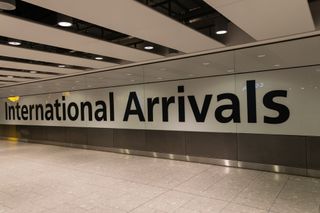Fewer immigrants with tech skills are being turned away from the UK
The government's move to remove healthcare workers from the cap had a big impact

More IT workers from overseas were able to take up jobs in the UK after the government relaxed the rules for skilled workers to enter the country last year.
The number of people refused entry into the UK after being offered jobs reduced by 68% after home secretary Sajid Javid removed the cap for healthcare workers - a sector that was previously taking up half of all allowed persons.
Because so many doctors and nurses were previously being allowed in due to high demand, it meant there were not enough available spaces for workers skilled in other areas, such as technology, to come to the UK.
The Campaign for Science and Engineering (CaSE) revealed that 6,080 people applying for visas in the UK were refused entry between December 2017 and March 2018, despite them meeting all the criteria required because the cap of allowed persons had been reached.
It filed a Freedom of Information (FOI) request to the government, asking for refusal figures in its quest to get the caps abolished altogether.
Every year, there's a cap of 20,700 applied to the number of skilled workers across various sectors allowed into the UK. This is split into months to ensure those arriving outside of the EU don't fill jobs that could be taken by UK or EU citizens instead.
The number of skilled technology workers refused a visa reached its highest in June 2018 when 541 people were not allowed to take up the job offers because there was not enough capacity.
Get the ITPro. daily newsletter
Receive our latest news, industry updates, featured resources and more. Sign up today to receive our FREE report on AI cyber crime & security - newly updated for 2024.
CaSE estimated that to pass entry during this period, applicants would need to have an annual salary of around 60,000 a year - twice that if the official requirements.
The cap was removed for healthcare workers the following month and this is when refusals dropped significantly - down to just 171.
In the following month, the cap wasn't reached, so all those ticking the boxes for Tier 2 visas were allowed entry into the UK.
"We want to make sure that any future migration system does not hold itself to an arbitrary cap," CaSE said in its findings. "The issues that the UK has had in recent months because of the cap should be a lesson to policymakers in the Home Office and members of Government.
"We will be working to ensure that UK immigration policy supports research & innovation, will facilitate frictionless movement, have proportionate system rules, be founded on robust evidence and fit for the future."

Clare is the founder of Blue Cactus Digital, a digital marketing company that helps ethical and sustainability-focused businesses grow their customer base.
Prior to becoming a marketer, Clare was a journalist, working at a range of mobile device-focused outlets including Know Your Mobile before moving into freelance life.
As a freelance writer, she drew on her expertise in mobility to write features and guides for ITPro, as well as regularly writing news stories on a wide range of topics.
Most Popular





